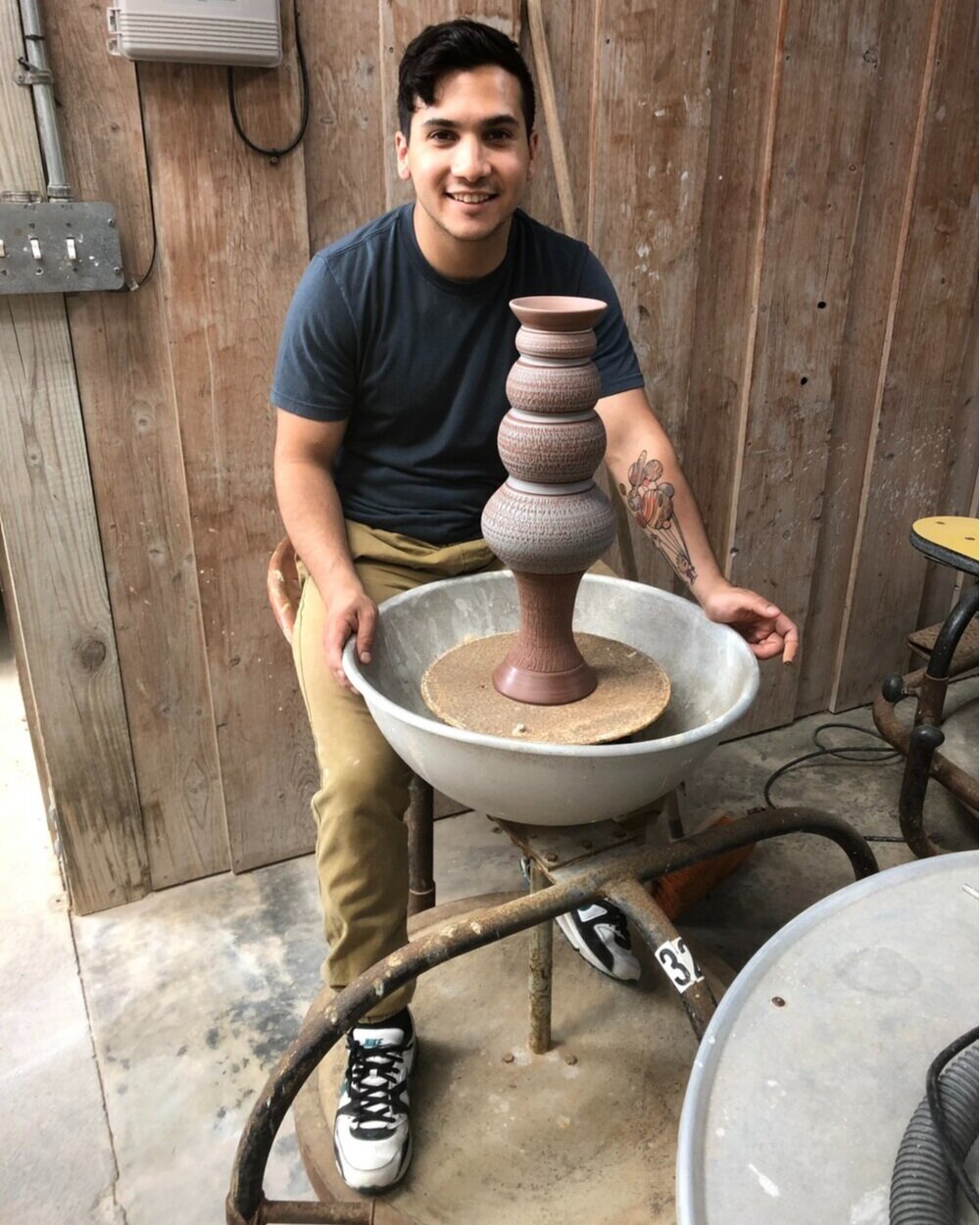hello. meet Anthony.
Photo by: Hadiya Gaiters
Thinker. Dreamer. Maker.
At just 24 years old, local ceramicist, Anthony Romero takes through his story from construction work to molding a future with his own two hands.
You’re a maker you’re a creator. Did you ever see yourself in the shoes you’re in now?
When I was growing up I didn’t even consider it. It was not the trajectory of my life at all.
It was the area I grew up in was very blue collar. My father is an immigrant from Honduras, and after meeting my mother in America, he moved to my home town and started a landscaping business. Growing up with 3 brothers, and in a poor family and area, there was a very specific type of way that we were expected to act. A very working area that didn't have room or conversation for artists or anything in perception outside of work. Everything was surrounded by how much money you were making.
Did you get the sense you were settling for being a blue collar life, or did you feel like you were missing something?
It felt like my life was planned for me already. When started 10th grade, I was working construction; I would get off from school and go to my construction job in the evening. I just new it was what I should be doing — it’s what my older brothers were doing, and we were used to that, we were used to going out making money.
It was hard though—this is something that was making money, it’s something my family was doing. I started looking at myself and saying “What do I actually want to do? Do I want to have impact? What do I want to have something more for myself??
What was that point for you?
It started early on. I was super confused about what my life was and curious about how everything was happening that I started getting into cosmology and studying sciences; and this was before art.
Did you feel like you had support at that time?
My parents got divorced when I was 8. My dad being from a third world country, we didn’t really have a lot of money, so my Mom had to bear the weight of the financial burden, which meant, she didn't have a lot of time to nurture and teach.
I would say it was nice because we had a lot of freedom, but we didn’t have any guidance. I was figuring out my own path the entire time from the beginning.
When did you realize, labor work was not the dream, and how did you take that first step to pivot toward who you are and become more in touch with that?
It was 2 years into college.
In high school, I was actually studying ceramics as well. When I graduated, I bought a kiln and a wheel with the money I had earned from working over the years. I was studying engineering in college, and on the weekends I would actually go home to my parents’ house where I had the studio, and I would just throw on the wheel in between math homework just to create.
I always thought this would be a side thing for me. I never anticipated it to come into focus in my life, it was always on the side or pushed over.
Photo by: Hadiya Gaiters
How did you ultimately make the decision of following the path of creativity? What was your greatest obstacle?
Finances is the biggest thing—it always is. And that was the most terrifying thing for me, will this make me money? That was something that when I finally made the call and I did switch over to art that was the thing I struggled staying in the most. You have a degree that isn’t necessarily going to get you a job out of school, isn’t necessarily going to make you money, and then sticking with it somehow.
You have to be so convinced in yourself that you’re going to make it that there’s no question anymore.
It was a wakeup call like I’m going to make this a reality. At some point you have to convince yourself that this is what’s going to happen.
I started putting in the hours and learning as much as I could. It was all about making this the ultimate priority. School was 12-16 hours a day, which for me, meant there were no breaks. It’s a grind. If you want it bad enough you have to make it reality, and hard work is the only way. It’s the only thing I knew growing up. And that’s what it turned into; no sleep, bad diet, it was everything, but it’s been worth it. I feel more open, more free. Where I am now, I couldn’t be happier from where I started
Photo by: Ryan Spillman
What sector of the creative art are you focused on and do you do?
I would like to say I do a couple different things; one is more of a craft basis, and one is more of a higher end conceptual basis,
So craft is what I’m doing for Bean2Bean, we’re doing mugs, utilitarianware and stuff like that. My personal vision with utilitarian ware is to bring handmade things into the home that wouldn’t be there otherwise.
We have this age of Amazon, right, where you can get anything to your door tomorrow. But the handmade mug doesn’t exist in that world, it exists outside. And I want to get it into your home where you can appreciate that, that someone else touched this, that someone else made this by hand. The vision for me as an artist is to alter the way we view every-day objects; to provide a lens or new perspective. If you look at a mug as a piece of art and evaluate it, see what it has to offer, you are then able to apply that perspective to any object or person or thing in your life; how does this have value? How can this be important, how is this important?
From a consumer standpoint, what would make me want to connect with someone like you?
Whenever I do a commission for someone, the mindset is “how does this piece create meaning for you?” If you live with this every day, how can I make this a memory or a moment. I’ll pull a memory from you and use that to inspire me as I work. A lot of it is created by the customer actually, it’s their ideas, their thoughts that are then inspired into this original piece of art. You’re getting something completely original that you had a part in the creative process.
Each project that you do takes time. How do you find time for the things that you do enjoy, outside of art.
it’s difficult, it comes down to that time management again. It’s scheduling. If I want to hang out with friends, that has a time on it now. Maybe that’s going to hang out for 4 hours and going to the studio after.
How do you stay inspired?
Environment is actually super important. I just moved, but I used to live with 5 artists. We set up the house like a gallery; it was a constant critique of yourself and evaluation of other people’s art, so you have the environment where people are constantly creating as well. Everybody in that house was part of a collective. It’s so motivational and important to be in the right environment. If I do get sidetracked, will I still be productive in what I want to do?
Of course we’re always having conversations about art, you know the “what is art” conversations and all that. But it’s really important to surround yourself with people who are not artists as well, because those are the people who we want to get hooked. We’re always talking about art, and we want the people who don’t talk about art to be interested. And that’s what makes us who we are as artists, is that we can create and we do stuff liek taht. But we need people who are not artists because they need us, it’s a symbiotic relationship that we can work together.
What are you doing next that you can create that excitement in the world of art?
It’s always trying to engage what may be a non-creative group to be creative. So we’re trying to inspire a doctor, for instance, to be more creative about his process and how they think about medicine. How can we make them think in a more creative way rather than the structure the other side of their brain is used to. That’s kind of been the thought process behind a project that I’m working on with another artist, TJ Moore, he’s actually a designer. We’re working on a mug to inspire you, inspires makers. Kind of like a makers mug so they can be part of the process. I like to think that in the morning when you’re drinking your coffee, you have a moment to yourself that you’re vulnerable. You have a moment to yourself and you’re thinking, how can I sort of creep into your thoughts in that moment and give you something strange, something unusual to make you think outside the box.
What’s the one piece of advice you’d give to somebody who is working a 9-5 and wants to, but may be a little afraid to break out of the norm?
Studying cosmology, which is the study of the universe, it’s about pulling back and seeing the broader scope of who we are as a people and in existence. A quote that comes to mind is “Nothing will exist besides empty space and matter; everything else is opinion.” There’s no situation where you have to follow through with this--if you don’t want to do it, you don’t have to. Our lifespan is super short, so what do you actually want to do while you’re here? And that’s probably one of the hardest questions to fully say and evaluate…
—Who am I, and who do I want to be?—
Photo by: Hadiya Gaiters










